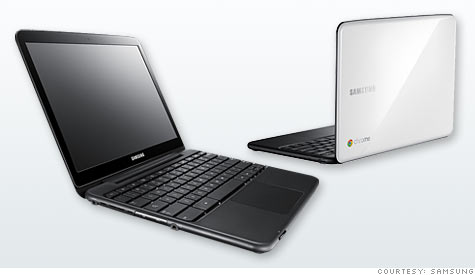
Google's Chromebooks are bare-bones laptops built around a Web browser. See Google's $500 Chromebook in action.
NEW YORK (CNNMoney) -- Could you do your job if the only thing installed on your PC was a Web browser?
Google thinks so. That's why the search giant will on Wednesday begin selling Chromebooks, Google's solution to the office PC.
Chromebooks offer access to the Web and the cloud ... and that's really just about it. But Google (GOOG, Fortune 500) thinks the cloud is ready to take on the task -- and that its solution is better than anything Microsoft (MSFT, Fortune 500) has to offer.
"No one is saying that they're satisfied with what they have; people are frustrated with tech in businesses," said David Girouard, president of Google's enterprise business. "Luckily, there is a choice now. With Chromebooks, we wanted to show the promise of the cloud solution."
Google is targeting its device at the enterprise. It's offering companies Chromebooks for $28 per user, per month, which includes all of the hardware and software maintenance costs. Google thinks that will be a winning proposition for IT administrators fed up with the cost and complexity of maintaining fleets of office PCs.
With that "promise of the cloud," Google believes it has its finger on the pulse of what PC users actually want. That's different from what Microsoft tells people it needs: a head-to-toe software model across all devices.
The best illustration of that battle of mindsets is the two companies' productivity solutions: Google Docs and Microsoft Office.
Docs, Google's Web-based suite of content tools, is a key Chromebook building block. But for businesses to switch to Google Docs, they'll have to accept what Google admits is a limited editing tool, compared to its biggest competitor.
"You can't do everything you can do in Word and Excel in Google Docs Spreadsheets, but there's no need for that," said Jonathan Rochelle, manager of the Google Docs product. "Microsoft relies too heavily on the features in its Office productivity suite. People will err on the side of ease of use, taking the place of individual features."
Unsurprisingly, Microsoft disagrees. The software king offers a similar cloud-based productivity suite in Office 365. But Microsoft played down 365's relevance as a stand-alone tool, saying its offline suite remains critically important for customers.
"There is no transformation to the cloud for Office," Kurt DelBene, president of Microsoft's business division, said in an interview earlier this year.
He sees the cloud as a supplement to Microsoft Office's core on-premise, PC-bound existence. People will use it for some tasks when they're on the go or working remotely, but most prefer to stick with Word for their main tasks.
"Half of the traffic we've seen so far is from people viewing e-mail attachments in the cloud," DelBene said.
But Rochelle thinks that just a small minority of Google Docs users actually need all the features of Microsoft Office.
For instance, he once believed finance teams would never be able to adopt Google Docs, because they rely on complex Excel tools. But the opposite turned out to be true: Across Google's entire client base, finance teams have reported the highest satisfaction rates with Google Docs, Rochelle claims.
The reason, he said, is Google's collaboration solution: multiple people can simultaneously work in the same document without saving it on a hard drive and sending it around as an attachment. That turned out to be more important to your average finance worker than the ability to use complicated Excel functions.
Google Docs' simpler nature may also be a security asset: Users view documents without ever downloading them, reducing the chances that they'll infect their PCs with malware.
"So many myths about the cloud are breaking down, especially in security," Rochelle said. "We went from fearing the security discussion to enjoying it."
Google says its enterprise business is growing rapidly -- which is easy to do when you start from almost nothing, as Google did several years ago. The company wouldn't give details on the size of its customer base. Most are small and medium-sized businesses, but some are from the Fortune 1000.
It's a long way off from seriously challenging Microsoft's workplace dominance. But Rochelle is looking forward to pushing the battle forward with Chromebooks.
"Office 365 never would have come about without us, but that doesn't give me a warm, fuzzy feeling inside," he said. "What does make me happy is that Microsoft is marketing Office 365 as 'Us versus Google,' which is proof that we're on the right path. The concept of the cloud has merit." ![]()